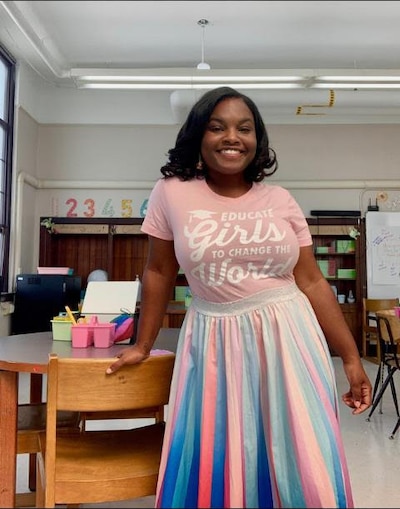I teach at my dream school — an all-girls public school rich in culture and diversity and in the same Detroit system where I was raised. From the day I started, I envisioned all the ways I would teach my students to have a powerful voice. I was convinced of the opposition they would face in the world as women of color, and I believed that I could help them grow up to be strong women.
Ironically, at the same time, I was exhausted from being strong.
I had come from another school where I was burnt out from the demands of hybrid teaching during COVID and making sure my students were OK during such a tumultuous time. Library shutdowns had negatively impacted Progressionista, the book club I started for girls in Detroit. All the while economic uncertainty, familial responsibilities, and social pressures loomed over me. My nervous system was in the worst shape of my life.

Yet when I came to work, I had something deeper than purpose; I had childlike joy. The pink uniforms that sprinkled my classroom and the light laughter that came from my third graders brought me back to my own girlhood. My desire to teach them to be strong melted away each day. We developed class songs that brought together our learning using melodies. We sat in circles and had beautiful discussions around identity. I re-braided hair and helped adjust hijabs back in place. Amid rigorous assignments and implementing the science of reading, I learned to breathe as a teacher. My classroom became a wonderland where joy was at the forefront.
But alongside the joy was grief. I grieved the adultification present in my own childhood attending Detroit Public Schools in the 1990s and early 2000s. Though I had incredible teachers, nothing about my classroom environments were soft or joyful. There were not many moments where I felt safe as a girl.
As early as third grade, I recall boys in class making comments about my body. Even rites of passage like my first period were humiliating. After a speaker came to our school and handed out menstrual products, a boy went into all the girls’ lockers and threw the products on the floor. All the boys laughed in unison at us picking them back up. I learned in school that being a girl was something to hide, riddled with shame, and I had to be strong if I wanted to navigate life as a woman.
I know that advocacy is only sustainable when balanced with joy and rest.
The lecturer and activist ebonyjanice describes in her book “All the Black Girls Are Activists’' that joy for Black women can be “an act of radical resistance.” Her work brings language to what my first-year teaching all-girls revealed to me. Teaching girls of color to be as strong as possible is inherently discriminatory. It rips away their right to be vulnerable and complex. It takes away their right to define their experiences as they see fit.
The joy we experienced in that third-grade class was revolutionary. As a self-proclaimed “strong Black woman” who was trained to be resilient by the dynamic women who raised me, too much joy made me feel guilty. To my fortune, I was taught how transformative joy-based pedagogy was to a classroom community.
That school year, I vividly remember welcoming two newcomers from Afghanistan into my classroom. It was my first experience with English Language Learners, and I had no idea how to connect with them. After buying children’s books in their dialect and having some basic English assignments prepared, I was lost at how to include them in the joyful community we’d built. One day, I decided to take my class to the gymnasium. The two Afghan girls, who had been quiet their first two days at school, were laughing and smiling alongside their classmates. There were no language or cultural barriers — just a group of girls and their teacher trying to get a ball through a net. Joy was the great equalizer.
In the three years I’ve taught at this all-girls public school, I have embraced joy I didn’t know was possible. I have remembered my girlhood.
While I know how important it is for my students to be able to write about the injustices they notice — using powerful women like Shirley Chisholm and Malala Yousafzai as role models — I know that advocacy is only sustainable when balanced with joy and rest.
After I complete lesson plans, I practice new cooking recipes. On school breaks, I scrapbook. During my lunch breaks, my students teach me to crochet. I embrace joyful hobbies to center myself amid the chaos that comes with strong womanhood. I celebrate my life, and I teach my students to do the same.
Shanel Adams is a teacher and literacy advocate committed to girls’ education, multicultural curricula, and project-based learning. She is the founder of Progressionista, a library-based book club program for girls where they meet a woman professional at each meeting. Adams is also an English and Language Arts teacher at Detroit International Academy for Young Women, the only all-girls public school in the state of Michigan.


